Published in Nacional number 632, 2007-12-20
INTERVIEW THE TRAINER OF THE CROATIAN NATIONAL SWIM TEAM
Dmitar Bobev – Bulgarian guru for Croatian swimmers
After Sanja Jovanovic recently set a new world record and won the gold metal in the European Championships, talks about his work with Croatian swimmers, the future of the sport, coming to Croatia in 1990, and his life in Rijeka
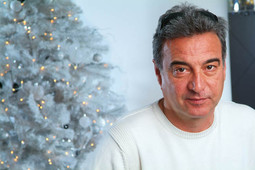 FACTORY OF CHAMPIONS Many Croatian swimmers such as Milos Milosevic, Duje Draganja, Gordan Kozulj and Sanja Jovanovic achieved top results because of their work with Bobev Sanja Jovanovic’s gold metal and world record in the 50 metre backstroke during the recent European Championships in the 25 metre pool is not only another success for Croatian swimmers; it is also a personal victory for Dmitar Bobev, the trainer of the Croatian National Swim Team. Without a doubt, Croatian swimming has began to develop and Croatian swimmers have began to win metals in all competitions since Bulgarian trainer Dmitar Bobev became the trainer of the national team in 1993.
FACTORY OF CHAMPIONS Many Croatian swimmers such as Milos Milosevic, Duje Draganja, Gordan Kozulj and Sanja Jovanovic achieved top results because of their work with Bobev Sanja Jovanovic’s gold metal and world record in the 50 metre backstroke during the recent European Championships in the 25 metre pool is not only another success for Croatian swimmers; it is also a personal victory for Dmitar Bobev, the trainer of the Croatian National Swim Team. Without a doubt, Croatian swimming has began to develop and Croatian swimmers have began to win metals in all competitions since Bulgarian trainer Dmitar Bobev became the trainer of the national team in 1993. 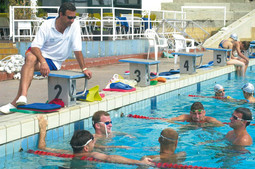 Bobev came to Rijeka in 1990 to train the Primorje swim team, because he was unhappy with his status in the Bulgarian national team. His work with the Primorje swim club proved to be excellent and, in 1993, he became the trainer of the national club, at a time when the representation had only one swimmer capable of winning a metal, Milos Milosevic. Milosevic moved to Rijeka because of Bobev, and began to win metals in World and European Championships, which was the first confirmation of the expertise and knowledge held by the Bulgarian trainer. Through his work with the national team, more and more swimmers began to attend the Olympic games, World Championship, as well as the European Championships, and the metals won and results made by Sanja Jovanovic, Duje Draganja, Gordan Kozulj and others are evidence of the quality of Dmitar Bobev’s work.
Bobev came to Rijeka in 1990 to train the Primorje swim team, because he was unhappy with his status in the Bulgarian national team. His work with the Primorje swim club proved to be excellent and, in 1993, he became the trainer of the national club, at a time when the representation had only one swimmer capable of winning a metal, Milos Milosevic. Milosevic moved to Rijeka because of Bobev, and began to win metals in World and European Championships, which was the first confirmation of the expertise and knowledge held by the Bulgarian trainer. Through his work with the national team, more and more swimmers began to attend the Olympic games, World Championship, as well as the European Championships, and the metals won and results made by Sanja Jovanovic, Duje Draganja, Gordan Kozulj and others are evidence of the quality of Dmitar Bobev’s work.
NACIONAL: Sanja Jovanovic stated that you were the only one who believed in her after winning the gold metal and setting a new world record. How is it possible that a year and a half ago, few believed in a swimmer who is exceptionally talented, but whose injury slowed her down in her development?
- I would not say that no one believed in her. There were many different people and many different opinions, but it is most important that she came back to the sport. I know it is most difficult for athletes when they are not achieving the best results, and are young and ready for the best. I believed in Sanja because I have followed her since she was 13. First we worked together in the sense that we met at various occasions, because she lived in Dubrovnik and I lived in Rijeka, so we would practice together for 10 or 15 days at a time. That is not enough for top results. After the European Champions in Budapest 2006 where she had very poor swimming results, I offered that she could come to train with me. She was desperate at that point and I was ready to work with her.
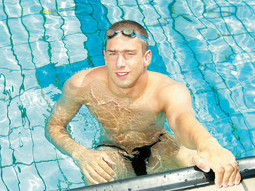 SASA IMPRIC became the European Junior Champion in 2004 in the 200 metre combination style NACIONAL: She then left her family and moved the Rijeka where she lives alone. Were you afraid that she would not manage to adapt to the new living conditions and training?
SASA IMPRIC became the European Junior Champion in 2004 in the 200 metre combination style NACIONAL: She then left her family and moved the Rijeka where she lives alone. Were you afraid that she would not manage to adapt to the new living conditions and training?
- There is always a risk. At the beginning, I alone was afraid of that, but she adapted quickly. She became aware that some things have to change. She trained with her colleagues in Rijeka; she was not alone, and all people around her have helped her to adapt much quicker.
NACIONAL: What did Sanja Jovanovic need to change?
- First she had to change her approach to training. There must be discipline in training. Then she had to change some details in her swimming style which cannot be changed easily. Then I insisted that she should constantly be under my control so that I could see if we were succeeding or not with the new swimming style. We changed the swimming techniques, the intensity of training, everything. We started to work together in September 2006 when she moved to Rijeka. In the first training sessions, she showed that she was changing.
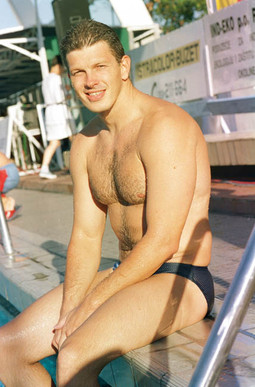 Bobev achieved his first success in Croatia WITH MILOS MILOSEVIC NACIONAL: Sanja Jovanovic is only one in a range of swimmers who came to Rijeka to work with you. How did you decide to come to Rijeka from Bulgaria?
Bobev achieved his first success in Croatia WITH MILOS MILOSEVIC NACIONAL: Sanja Jovanovic is only one in a range of swimmers who came to Rijeka to work with you. How did you decide to come to Rijeka from Bulgaria?
- I arrived in Rijeka on 15 September 1990 by accident. Aleksandar Skanata, my colleague from Belgrade, came to training in Sofia. He then trained sprinters and told me: “You don’t know me, but I know you; will you help me?” We worked together for 15 days; I helped him with the training program, and then he asked me if I would come to work in Yugoslavia. Following the 1988 Olympic Games when the Bulgarian swimmers had good results, I was not satisfied with my status in the national team. The Bulgarian Association was requesting that I focus only on swimmers who were going to the 1992 Olympic Games, and not on the young swimmers which I did not agree with. The atmosphere was bad and all trainers were exhausted. We were looking for changed and I told Skanata that I had been invited to Greece, where I did not want to go because their swimmers did not have a professional approach towards sports. Because they were seeking a trainer in Rijeka, I sent my CV and the results which I had attained. I came to Rijeka for four days, saw what I was dealing with and the young swimmers that were available. I did not intend to stay for 18 years; I signed a contact for two years with the possibility to extend the contract for another two.
NACIONAL: Before you became a trainer, you were a swimmer yourself.
- Yes, I was a talented swimmer in the cadet and the junior national teams, but I stopped swimming professionally at 22. I became a trainer for the Levski club from Sofia. Because I previously worked with the coach of the Bulgarian national team, he very quickly took me in as his assistant for the national team alongside three more trainers in 1984.
NACIONAL: I heard that your wife influenced your decision because she liked Rijeka as a city.
- She was the one who mentioned Rijeka when I talked to Skanata that evening. She participated in the Balkan Games in 1983 in Rijeka and she really liked the city. Skanata remember that Rijeka needed a coach and that is how we arrived in Rijeka.
NACIONAL: The first two-year contract expired in 1992, after the Olympic Games in Barcelona. How did you decide to stay, despite the fact that the Croatian National Swim Team, could not travel to Barcelona following a decision made by the then president of the Croatian Olympic Committee, Antun Vrdoljak?
- Even though at that time I did not have any responsibilities towards the national team, I was very sorry. I don’t like to comment that event. I know that Antun Vrdoljak sometimes makes certain statements. The swimmers at Primorje who I worked with did not have the results to attend the Olympic Games, but it was strange to me that Croatia did not send its swimmers. That decision influenced Croatian swimming so at the next state championship the swimming results were catastrophic and the atmosphere was awful.
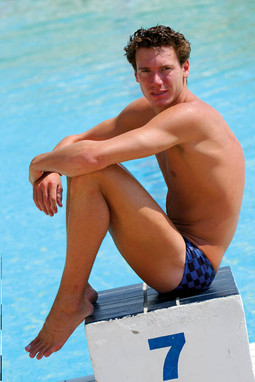 DUJE DRAGANJA trains with Dmitar Bobev in the summer when he comes from the United States NACIONAL: When the majority of Croatian swimmers have began to recognize you as an excellent trainer, with whom would you like to work?
DUJE DRAGANJA trains with Dmitar Bobev in the summer when he comes from the United States NACIONAL: When the majority of Croatian swimmers have began to recognize you as an excellent trainer, with whom would you like to work?
- Milos Milosevic was the first to come to me in March 1993. At that time the swimmers in Primorje, such as Marijan Kanjer, Alen Loncar and Gabrijela Lončar, showed great improvements. Milosevic asked me if he could come to Rijeka and swim for me, which I accepted. After he created excellent results at the Mediterranean Games in Montpellier, everything went forward. Before that, in October 1992, I was selected as the trainer of the national team, so that I could create a plan to prepare for the 1996 Olympic Games. After the Mediterranean Games, the European Championships were held in Sheffield, where Milosevic again won a metal; he then became the European Champion in 1999 and the World Champion in the 50 metre butterfly stroke. That’s when everything changed.
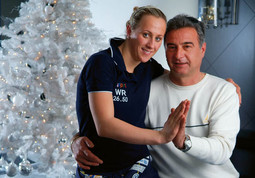 TRAINER FOR SUCCESS Sanja Jovanovic became the European champion and a world record holder after eighteen months with Dmitar Bobe NACIONAL: Because Croatia only had and still has two covered pools, and at that time only had a small group of swimmers, it required a huge amount of will to start working and remain in Croatia.
TRAINER FOR SUCCESS Sanja Jovanovic became the European champion and a world record holder after eighteen months with Dmitar Bobe NACIONAL: Because Croatia only had and still has two covered pools, and at that time only had a small group of swimmers, it required a huge amount of will to start working and remain in Croatia.
- I thought I would leave in 1992 after the bad state championships because I was not satisfied with the results made by the swimmers that I was training. Then I told the club’s management that I would stay for one more year to get the results which I believe were good and that I can achieve. That motivated me to stay until 1993. Then the world championship came in 1994 where the relay team nearly reached the finals; afterwards came the preparations for the 1996 Olympic Games, and the arrival of young swimmers such as Marko Strahija, Gordan Kozulj, and Kresimir Cac. And I decided to stay. After the 1996 Olympic Games, I stayed because of one more Olympic cycle, then another, and that is how I have stuck around. Most of all, I stuck around because the swimmers results were getting much better. Today I say that Croatia has a very large sports potential; I don’t know any other country that has so many sports talents. When I compare the situation in 1991 to today, swimming is spreading and improving. I was motivated by the potential which I saw in Croatians.
NACIONAL: Did you think that if you went to another country, you would have done better financially?
- Whenever you arrive somewhere for the first time, you state your financial demands, the other side offers something less, and then you reach an agreement. Through these 18 years, the reason I stayed in Croatia were not financial. Maybe I would have done better financially somewhere else; I received invitations from, for example, clubs in Italy in the 1990’s. Simply put, I became connected to Croatia and I also like to finish what I start. I did not want to leave Croatia with unfinished work because I would receive 300 or 500 DM more in Italy. Money never led me through life.
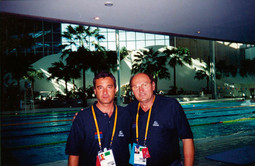 DR. IVAN VARVODIC, the director of the Croatian National Swim Team NACIONAL: Several of our swimmers went to school in the United States, and a legend emerged from Berkeley University, but you claim that the United States does not guarantee advancement.
DR. IVAN VARVODIC, the director of the Croatian National Swim Team NACIONAL: Several of our swimmers went to school in the United States, and a legend emerged from Berkeley University, but you claim that the United States does not guarantee advancement.
- I still think that. I am sure that our swimmers who go to the United States are worth something. If they are good, then they should select a university and club which can offer them better conditions so that they can further develop and not only to say that “I am going to America”. Not all of the United States is like Berkeley. It is easier to study and train in the United States, but not everywhere. Draganja improved at Berkeley, Kozulj advanced, but we also have a specific number of swimmers who went to the United States as quality juniors and came back with poor or average results.
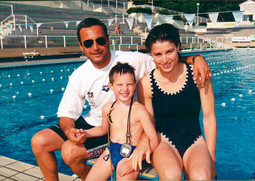 DMITAR BOBEV with his wife, a former swimmer and member of the Bulgarian national team NACIONAL: Did you speak to Draganja when he was considering taking Qatar citizenship and swimming for their national team?
DMITAR BOBEV with his wife, a former swimmer and member of the Bulgarian national team NACIONAL: Did you speak to Draganja when he was considering taking Qatar citizenship and swimming for their national team?
- Yes, we spoke. I still believe that every grown man has the right to his own opinion. He might have been able to solve his existential questions, but he alone admitted that if he would be able to train in Croatia and develop his career, he would stay. I know Draganja, he is very connected to Croatia but it would be difficult to try to talk him into a different decision. I am glad he stayed because I was aware that he wanted to remain in Croatia. Personally, I was not able to help him in that decision; I only gave him friendly advice and support.
NACIONAL: When the famous American swimming coach Mike Bottom came to Croatia and became a member of the national team, people had different opinions. Some believe that it was good that he arrived, while others thought that national trainers were being ignored. What do you think?
- Mike Bottom is a proven expert and his swimmers won the gold metal in the 50 metre free style in the Olympic Games in 2000 and 2004, which is a huge success. I personally have nothing against him being brought here because I can learn something from him, and if he agrees he could learn something from me. We trainers should not be afraid of new trainers arriving who have done something more and better than us. When you discuss the national team, you have to do everything to ensure that the swimmers give their maximum, and it’s not important whether the trainer is going to be Bottom, Bobev, Pero Kuterovac or anyone else.
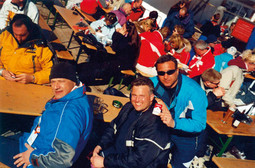 Dmitar Bobev skiing with his brother Svetoslav Bobev who works as a trainer in Pula’s swim club NACIONAL: It was recently announced that the results showed that Marko Strahija failed the doping test but that he probably has testicular cancer. Did you believe that he was clean?
Dmitar Bobev skiing with his brother Svetoslav Bobev who works as a trainer in Pula’s swim club NACIONAL: It was recently announced that the results showed that Marko Strahija failed the doping test but that he probably has testicular cancer. Did you believe that he was clean?
- I worked with Strahija four years ago when he was first accused and I was 200% sure that he was innocent. I then decided to send him to additional tests, but they were not detailed enough to uncover his medical problems. I was convinced that Strahija was clean. We are all careful of doping because none of us got our diplomas on the street. Apart from that, we get our vitamins for top athletes through the Croatian Olympic Committee. Our male and female athletes would not defy the trainers’ decision and go to the pharmacy and buy something on their own. Furthermore, Croatia does not have enough money to work on systematic doping usage where there are entire medical teams surrounding the athletes.
NACIONAL: Is your family satisfied with their lives in Rijeka?< br />- Of course they are satisfied. We have grown accustomed to life in Rijeka. When I though about returning to Bulgaria after the 2000 Olympic Games, my wife was against the idea and told me that I am crazy. My wife Bistra Gospodinova works as a trainer in the Primorje swim team, and got her Masters at the sports academy in Sofia. She was a swimmer whom I trained and had very good results. She was sixth in the 1988 Olympic Games in Seoul and third in the European championships. She knows what my job is like; she was my swimmer and she knows how many nerves I lost because of her. My son Stefan is 13 and lives with his grandmother in Sofia. Unfortunately, he doesn’t like sports. We left him in Sofia because you never know what can happen in this line of work; today we are in Croatia and tomorrow we can be in another country. I did not want him to change schools and languages. He spends three months every summer in Croatia, and he likes to fish and ski.
'Some people were bothered that I was Bulgarian'
NACIONAL: Were you surprised that Croatia, as a Mediterranean country, took a Bulgarian to train their national team?
- That was just a turn of events; the former trainer of the national team and his deputy resigned in 1992 and there was no one else. There were then comments such as ”Why did they take a Bulgarian; a Bulgarian isn’t going to teach us how to swim”, but I did not focus on that.
NACIONAL: How good or bad is it for Croatian swimming that during the past five years swimmers such as Duje Draganja and Sanja Jovanovic have come to Rijeka because of you?
- I always first ask whether a swimmer can remain in his club and work with me. I never convinced anyone to leave their club. Sanja Jovanovic came to Rijeka, but I asked her to keep swimming for her club in Dubrovnik. Because of one good swimmer in one city, 200 children will come to the pool and begin swimming. They can assist in the improvement of the club. The concentration of all the best swimmers in one centre pays off only if there are no conditions in the other cities so then you give the best conditions to the most talented. In the long term, it’s not a good thing. I think that we succeeded in expanding swimming to other cities; in the mid 1990’s, we had training in Sisak. Six years later, a swim club was established because the children were interested in watching Milosevic, Tomislav Karl and others as they practiced. We did the same in Varazdin and Osijek to make children interested in swimming.
Latest news
-
28.10.2010. / 14:15
'A profitable INA is in everyone's interest'
-
28.10.2010. / 09:38
Sanader’s eight fear SDP — Won’t bring down Government
-
21.10.2010. / 15:02
Interior Ministry turned a blind eye on Pukanic assassination
-
20.10.2010. / 09:34
Barisic could bankrupt HDZ



